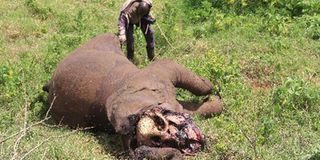Tanzania jails Chinese ivory smuggler for 20 years

A member of the public views a carcass of a male elephant that was killed at Hombe area in Mt Kenya forest on January 9, 2014. PHOTO: JOSEPH KANYI
What you need to know:
- The heavy sentence follows moves by neighbouring Kenya to toughen laws and increase sentences to stop a spate of poaching of wildlife across the wider East Africa region.
- Tanzanian police launched late last year a crackdown on suspected poachers amid a spate of killings of elephant and rhino, operating under what was reported to be a shoot-to-kill policy and making sweeping arrests.
A court in Tanzania jailed on Wednesday a Chinese ivory smuggler for 20 years amid a crackdown to stem a surge in poaching.
Yu Bo, 45, pleaded guilty to unlawful possession of 81 elephant tusks and the skins of two pangolins, which are also known as scaly anteaters, lawyers said.
"The accused was convicted on his own plea of guilty, and we asked for a severe penalty as a deterrent measure," Faraja Nchimbi, a state lawyer, told AFP.
The heavy sentence follows moves by neighbouring Kenya to toughen laws and increase sentences to stop a spate of poaching of wildlife across the wider East Africa region.
Yu was arrested in December near the port of Dar es Salaam -- a key transit hub for smuggled ivory from across East Africa - with the tusks found hidden in a pick-up.
Tanzanian police launched late last year a crackdown on suspected poachers amid a spate of killings of elephant and rhino, operating under what was reported to be a shoot-to-kill policy and making sweeping arrests.
Poaching has risen sharply in Africa in recent years. Besides targeting rhinos, whole herds of elephants have been massacred for their ivory - threatening the tourism sector, a key foreign currency earner for Tanzania.
Millions of dollars of elephant tusks and rhino horns are smuggled out of East Africa each year, according to United Nations experts, partly fuelled by an increasingly affluent Chinese middle class.
An INTERPOL report last month said there had been record levels of global ivory seizures worldwide in 2013.





